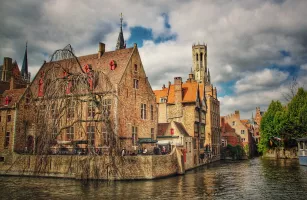The Pantheon Travel Guide
Located in the heart of Rome, Italy, The Pantheon is a historical marvel that dates back to 126 AD. This ancient temple turned church is famous for its impressive dome, which remains the world's largest unreinforced concrete dome. The Pantheon is a symbol of Roman engineering prowess and architectural beauty, attracting visitors from around the globe to marvel at its grandeur. The city of Rome itself is steeped in history, with remnants of its glorious past scattered throughout the bustling streets, making it a must-visit destination for history buffs and culture enthusiasts alike.Top Attractions in The Pantheon
- Piazza Navona
- Trevi Fountain
- Roman Forum
- Vatican City
- Colosseum
The Pantheon is Famous for
Its iconic dome and remarkable architectural design.Top Attractions in The Pantheon
- Admiring the oculus in the dome
- Exploring the tombs of famous Italians
- Witnessing the Pantheon's beautiful marble interior
- Attending a mass or concert in the church
What's Great about Travelling to The Pantheon?
- Rich historical significance
- Architectural marvels at every corner
- Cultural immersion in Roman heritage
What's Not So Great about Travelling to The Pantheon?
- High tourist traffic
- Summer crowds can be overwhelming
- Limited parking options in the city
Travel Tips for The Pantheon
- Observe proper attire when visiting churches
- Use public transportation to avoid traffic
- Stay hydrated and wear comfortable shoes for walking
Important The Pantheon trip information
- Ideal Duration: 2-3 days
- Best Time to Visit: Spring or Fall for pleasant weather
- Nearby Airports and Railway Stations: Fiumicino Airport, Termini Station
Total
3,94,500
*EXCLUDING APPLICABLE TAXES 5.0 Ratings
( 20 Reviews )
( 20 Reviews )
Per Person
2,43,750
*EXCLUDING APPLICABLE TAXES 5.0 Ratings
( 20 Reviews )
( 20 Reviews )
Per Person
3,01,500
*EXCLUDING APPLICABLE TAXES 5.0 Ratings
( 20 Reviews )
( 20 Reviews )
Total
4,70,000
*EXCLUDING APPLICABLE TAXES 5.0 Ratings
( 20 Reviews )
( 20 Reviews )
Total
16,94,500
*EXCLUDING APPLICABLE TAXES 5.0 Ratings
( 20 Reviews )
( 20 Reviews )
Total
5,32,000
*EXCLUDING APPLICABLE TAXES 5.0 Ratings
( 20 Reviews )
( 20 Reviews )
FAQ's on The Pantheon
Q1: What is the best time to visit The Pantheon?
The best time to visit The Pantheon is during the spring months of April to June and the fall months of September to October when the weather is mild, and the tourist crowds are not as overwhelming. However, if you want to experience the vibrant local culture, consider visiting during popular events such as the Pantheon's Foundation Day in April or the Feast of All Saints in November.
Q2: Do I need a visa to travel to The Pantheon?
Most visitors to The Pantheon, coming from the EU, the UK, the US, Canada, Australia, and many other countries, do not need a visa for stays of up to 90 days. However, it is essential to check the specific visa requirements based on your nationality before traveling.
Q3: What are the must-visit attractions in The Pantheon?
The Pantheon is home to iconic landmarks such as the Parthenon, Acropolis, Plaka neighborhood, Temple of Olympian Zeus, and the National Archaeological Museum. Don't miss exploring the picturesque Santorini island, the ancient ruins of Delphi, and the stunning beaches of Crete.
Q4: Is The Pantheon a safe place to travel?
The Pantheon is generally a safe destination for travelers. However, like any other city, it is advisable to stay cautious of pickpockets in crowded areas and avoid poorly lit or deserted streets at night. It's recommended to keep your belongings secure and be aware of your surroundings.
Q5: What is the local currency in The Pantheon and can I use credit cards?
The local currency in The Pantheon is the Euro (€). Credit cards are widely accepted in most establishments, especially in tourist areas. ATMs are also readily available in major cities and towns for convenient cash withdrawals.
Q6: What is the local cuisine like in The Pantheon?
offers a diverse culinary experience with traditional dishes like moussaka, souvlaki, gyros, and fresh seafood. Make sure to try local specialties such as feta cheese, olives, tzatziki, and baklava. Vegetarians and vegans will also find plenty of options to enjoy.
Q7: What transportation options are available in The Pantheon?
Transportation options in The Pantheon include an efficient network of buses, trams, and metro systems in major cities. Taxis are also readily available, but it's essential to use licensed services. Car rentals are popular for exploring the countryside and remote areas.
Q8: Are there any cultural norms or etiquette I should be aware of when visiting The Pantheon?
When visiting The Pantheon, it is essential to respect local customs such as dressing modestly when visiting religious sites, greeting people with a friendly "Kalimera" (good morning), and avoiding discussing sensitive topics like politics or religion. Remember to take your shoes off before entering someone's home as a sign of respect.
Q9: I am a travel agent. How can I buy travel leads of The Pantheon?
Register yourself as a travel agent at agents.tripclap.com and then you can buy travel leads to The Pantheon once your account is approved. For more details contact our support team at +91-8069186564 or support@tripclap.com






